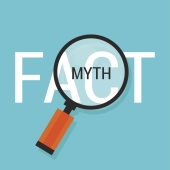Myths and Facts About Social Security
Myth: Social Security will provide most of the income you need in retirement.
Fact: It's likely that Social Security will provide a smaller portion of retirement income than you expect.
There's no doubt about it — Social Security is an important source of retirement income for most Americans. According to the Social Security Administration (SSA), nearly nine out of ten individuals age 65 and older receive Social Security benefits. 1
But it may be unwise to rely too heavily on Social Security, because to keep the system solvent, some changes will have to be made to it. The younger and wealthier you are, the more likely these changes will affect you. But whether retirement is years away or just around the corner, keep in mind that Social Security was never meant to be the sole source of income for retirees. As President Dwight D. Eisenhower said, "The system is not intended as a substitute for private savings, pension plans, and insurance protection. It is, rather, intended as the foundation upon which these other forms of protection can be soundly built."
No matter what the future holds for Social Security, focus on saving as much for retirement as possible. When combined with your future Social Security benefits, your retirement savings and pension benefits can help ensure that you'll have enough income to see you through retirement.
Myth: If you earn money after you retire, you'll lose your Social Security benefit.
Fact: Money you earn after you retire will only affect your Social Security benefit if you're under full retirement age.
Once you reach full retirement age, you can earn as much as you want without affecting your Social Security retirement benefit. But if you're under full retirement age, any income that you earn may affect the amount of benefit you receive.
- If you're under full retirement age, $1 in benefits will be withheld for every $2 you earn above a certain annual limit. For 2025, that limit is $23,400.
- In the year you reach full retirement age, $1 in benefits will be withheld for every $3 you earn above a certain annual limit until the month you reach full retirement age. If you reach full retirement age in 2025, that limit is $62,160.
Even if your monthly benefit is reduced in the short term due to your earnings, you'll receive a higher monthly benefit later. That's because the SSA recalculates your benefit when you reach full retirement age and omits the months in which your benefit was reduced.
| If you were born in: | Your full retirement age is: |
| 1955 | 66 and 2 months |
| 1956 | 66 and 4 months |
| 1957 | 66 and 6 months |
| 1958 | 66 and 8 months |
| 1959 | 66 and 10 months |
| 1960 and later | 67 |
If you were born on January 1 of any year, refer to the previous year to determine your full retirement age.
Myth: Social Security is only a retirement program.
Fact: Social Security also offers disability and survivor benefits.
With all the focus on retirement benefits, it's easy to overlook the fact that Social Security also offers protection against long-term disability. And when you receive retirement or disability benefits, your family members may be eligible to receive benefits, too.
Another valuable source of support for your family is Social Security survivor insurance. If you were to die, certain members of your family, including your spouse, children, and dependent parents, may be eligible for monthly survivor benefits that can help replace lost income.
For specific information about the benefits you and your family members may receive, visit the Social Security Administration website at ssa.gov, or call 800-772-1213 if you have questions.
Myth: Social Security benefits are not taxable.
Fact: You may have to pay taxes on your Social Security benefits if you have other income.
If the only income you had during the year was Social Security income, then your benefit generally isn't taxable. But if you earned income during the year (either from a job or from self-employment) or had substantial investment income, then you might have to pay federal income tax on a portion of your benefit. Up to 85% of your benefit may be taxable, depending on your tax filing status (e.g., single, married filing jointly) and the total amount of income you have.
For more information on this subject, see IRS Publication 915, Social Security and Equivalent Railroad Retirement Benefits.
Myth: Social Security is going bankrupt soon.
Fact: Social Security is facing significant financial challenges, but is not going bankrupt.
Social Security is largely a pay-as-you-go system with today's workers (and employers) paying for today's retirees through the collection of payroll (FICA) taxes. These taxes and other income are deposited in Social Security trust funds and benefits are paid from them.
According to the SSA, due to demographic factors, Social Security is already paying out more money than it takes in. However, by drawing on the Old-Age and Survivors Insurance (OASI) Trust Fund, the SSA estimates that Social Security should be able to pay 100% of scheduled benefits until fund reserves are depleted in 2033. Once the trust fund reserves are depleted, payroll tax revenue alone should still be sufficient to pay about 79% of scheduled benefits. So at that time, if no changes are made, beneficiaries may receive a benefit that is about 21% less than expected. 2
That's not good news, but Congress still has time to make changes to strengthen the program and address projected shortfalls. Until then, consider various income scenarios when planning for retirement.




